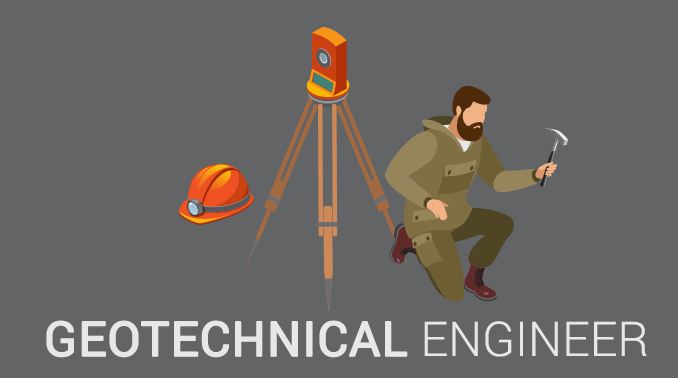Not known Incorrect Statements About Geotheta
Wiki Article
Geotheta for Dummies
Table of ContentsIndicators on Geotheta You Need To KnowThe Geotheta DiariesGeotheta Can Be Fun For EveryoneA Biased View of GeothetaSome Known Questions About Geotheta.

They carry out website examinations, accumulate samples, carry out laboratory tests, and examine information to evaluate the suitability of the ground for construction jobs - Consulting Engineers. Based on their findings, geotechnical designers offer suggestions for foundation layout, slope stability, retaining structures, and reduction of geotechnical threats. They team up with other experts, such as engineers, architectural designers, and building teams, to make sure that geotechnical factors to consider are incorporated into the total task layout and implementation
By examining the habits and residential properties of dirt and rock, they can recognize potential geotechnical dangers such as landslides, dirt settlement, or incline instability. Their competence assists stop failures or accidents that might endanger lives and building. Right here are some thorough duties and obligations of a geotechnical engineer: Site Examination: Geotechnical engineers conduct website examinations to collect data on subsurface problems.
They analyze the data to understand the buildings and actions of the dirt and rock, including their stamina, permeability, compaction qualities, and groundwater conditions. Geotechnical Analysis and Layout: Geotechnical engineers examine the data collected throughout website investigations to analyze the security and suitability of the site for construction projects. They carry out geotechnical estimations and modeling to evaluate aspects such as birthing capability, settlement, slope stability, side planet pressures, and groundwater circulation.
The Definitive Guide for Geotheta
Structure Style: Geotechnical engineers play a vital duty in developing foundations that can safely sustain the desired structure. They assess the dirt conditions and lots requirements to determine the proper foundation kind, such as shallow foundations (e.g., footings), deep foundations (e.g (https://es.quora.com/profile/Ian-Hammond)., heaps), or specialized methods like soil improvement. They think about elements such as negotiation limits, bearing capability, and soil-structure interaction to develop optimal foundation layoutsThey examine building strategies, monitor site tasks, and carry out field evaluations to confirm that the layout suggestions are adhered to. If unanticipated geotechnical issues arise, they analyze the circumstance and offer recommendations for removal or modifications to the layout. Danger Analysis and Mitigation: Geotechnical designers assess geotechnical threats and threats connected with the project website, such as landslides, liquefaction, or soil disintegration.

Partnership and Interaction: Geotechnical engineers function carefully with various other specialists associated with a task, such as designers, architectural engineers, and construction groups. Effective interaction and partnership are important to incorporate geotechnical factors to consider right into the overall project style and building process. Geotechnical designers provide technical expertise, response questions, and guarantee that geotechnical demands are fulfilled.
5 Simple Techniques For Geotheta
Here are some kinds of geotechnical designers: Foundation Engineer: Foundation designers concentrate on making and evaluating structures for frameworks. They assess the dirt problems, tons demands, and website features to establish the most suitable foundation type and design, such as shallow structures, deep structures, or specialized strategies like stack foundations.They examine the variables influencing slope stability, such as soil properties, groundwater conditions, and incline geometry, and create strategies to prevent slope failures and mitigate risks. Earthquake Engineer: Earthquake engineers specialize in evaluating and making frameworks to withstand seismic pressures. They evaluate the seismic hazard of a site, review dirt liquefaction possibility, and create seismic style criteria to make certain the safety and strength of frameworks during earthquakes.
They execute field testing, accumulate examples, and examine the gathered information to characterize the soil properties, geologic developments, and groundwater conditions at a website. Geotechnical Instrumentation Engineer: Geotechnical instrumentation designers concentrate on surveillance and determining the actions of dirt, rock, and frameworks. They set up and preserve instrumentation systems that monitor factors such as dirt negotiation, groundwater levels, incline movements, and structural variations to examine performance and supply very early warnings of possible problems.
The 7-Second Trick For Geotheta
They perform tests such as triaxial tests, debt consolidation tests, direct shear tests, and permeability examinations to collect data for geotechnical analysis and style. Geosynthetics Engineer: Geosynthetics designers concentrate on the design and application of geosynthetic products, such as geotextiles, geogrids, and geomembranes. They use these materials to enhance dirt security, reinforce inclines, give drainage remedies, and control erosion.They often tend to be investigative individuals, which means they're intellectual, introspective, and investigative. They are curious, methodical, reasonable, logical, and logical. A few of them are likewise social, meaning they're kind, generous, cooperative, individual, caring, handy, empathetic, tactful, and pleasant. Does this noise like you? Take our cost-free career test to learn if geotechnical designer is among your top occupation matches.
In the office environment, geotechnical designers make use of specialized software program devices to do computations, produce designs, and assess data. They prepare records, testimonial job requirements, connect with clients and team participants, and coordinate job activities. The workplace setup offers a conducive setting for research, evaluation, and partnership with other professionals included in the project.
Excitement About Geotheta
They regularly go to this link job sites to carry out website investigations, assess geotechnical conditions, and collect data for analysis. These brows through involve traveling to various areas, occasionally in remote or difficult surfaces. Geotechnical designers might carry out soil sampling, conduct tests, and display building activities to make certain that the geotechnical aspects of the job are being implemented properly.Geotechnical designers also operate in specialized geotechnical research laboratories. In these facilities, they conduct experiments, perform tests on soil and rock samples, and assess the engineering residential or commercial properties of the products. Geotechnical research laboratory engineers work extensively in these environments, managing testing devices, running tools, and taping data. They team up with other lab team to make sure accurate and trusted screening outcomes.
Report this wiki page